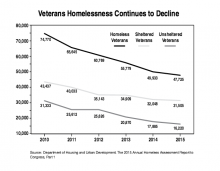User login
President Barak Obama released a $4 trillion national budget proposal yesterday, which included a request for $78.7 billion in discretionary funding for VA health care—a 5% rise over the 2016 budget. Nearly half the budget’s discretionary spending would go to a beefed-up DoD, although health care spending is a small fraction of that total. The budget is not expected to pass the Republican-led House of Representatives, but it offers a road map for the President’s priorities during his final year in office.
One of these priorities is precision medicine and fighting cancer. The National Institutes of Health (NIH) would receive $195 million in new cancer initiatives for the cancer “moonshot;” another $33.1 billion would support biomedical research through NIH, providing “about 10,000 new and competing NIH grants that will help us better understand the fundamental causes and mechanisms of disease, like the BRAIN Initiative and Precision Medicine.”
Hiring more health care providers remains a top priority for the VA, which expects to spend $1.4 billion in 2016 and $853 million in 2017 on 9,700 new medical care staff hired through the Veterans Choice Act. The VA also targets more than $1 billion for facility improvements over the course of 2016 and 2017.
The proposed budget also dedicated $1.6 billion for fully eliminating veteran homelessness. While the President’s time line has slipped from 2015 to 2020, the White House is still focused on the topic. Most of that funding will go toward housing vouchers and rapid rehousing and includes $300 million for Supportive Services for Veteran Families, $496 million for VA case management services for at-risk veterans, and $247 million in grant and per diem payments that support temporary housing provided by community-based organizations.
The budget proposal also noted the recent efforts of the DoD to modernize and streamline its health care operations under the Defense Health Agency. Further goals outlined within the budget proposal call for the DoD to “simplify TRICARE” and add choices for beneficiaries—including TRICARE for life—to better use existing military treatment resources.
President Barak Obama released a $4 trillion national budget proposal yesterday, which included a request for $78.7 billion in discretionary funding for VA health care—a 5% rise over the 2016 budget. Nearly half the budget’s discretionary spending would go to a beefed-up DoD, although health care spending is a small fraction of that total. The budget is not expected to pass the Republican-led House of Representatives, but it offers a road map for the President’s priorities during his final year in office.
One of these priorities is precision medicine and fighting cancer. The National Institutes of Health (NIH) would receive $195 million in new cancer initiatives for the cancer “moonshot;” another $33.1 billion would support biomedical research through NIH, providing “about 10,000 new and competing NIH grants that will help us better understand the fundamental causes and mechanisms of disease, like the BRAIN Initiative and Precision Medicine.”
Hiring more health care providers remains a top priority for the VA, which expects to spend $1.4 billion in 2016 and $853 million in 2017 on 9,700 new medical care staff hired through the Veterans Choice Act. The VA also targets more than $1 billion for facility improvements over the course of 2016 and 2017.
The proposed budget also dedicated $1.6 billion for fully eliminating veteran homelessness. While the President’s time line has slipped from 2015 to 2020, the White House is still focused on the topic. Most of that funding will go toward housing vouchers and rapid rehousing and includes $300 million for Supportive Services for Veteran Families, $496 million for VA case management services for at-risk veterans, and $247 million in grant and per diem payments that support temporary housing provided by community-based organizations.
The budget proposal also noted the recent efforts of the DoD to modernize and streamline its health care operations under the Defense Health Agency. Further goals outlined within the budget proposal call for the DoD to “simplify TRICARE” and add choices for beneficiaries—including TRICARE for life—to better use existing military treatment resources.
President Barak Obama released a $4 trillion national budget proposal yesterday, which included a request for $78.7 billion in discretionary funding for VA health care—a 5% rise over the 2016 budget. Nearly half the budget’s discretionary spending would go to a beefed-up DoD, although health care spending is a small fraction of that total. The budget is not expected to pass the Republican-led House of Representatives, but it offers a road map for the President’s priorities during his final year in office.
One of these priorities is precision medicine and fighting cancer. The National Institutes of Health (NIH) would receive $195 million in new cancer initiatives for the cancer “moonshot;” another $33.1 billion would support biomedical research through NIH, providing “about 10,000 new and competing NIH grants that will help us better understand the fundamental causes and mechanisms of disease, like the BRAIN Initiative and Precision Medicine.”
Hiring more health care providers remains a top priority for the VA, which expects to spend $1.4 billion in 2016 and $853 million in 2017 on 9,700 new medical care staff hired through the Veterans Choice Act. The VA also targets more than $1 billion for facility improvements over the course of 2016 and 2017.
The proposed budget also dedicated $1.6 billion for fully eliminating veteran homelessness. While the President’s time line has slipped from 2015 to 2020, the White House is still focused on the topic. Most of that funding will go toward housing vouchers and rapid rehousing and includes $300 million for Supportive Services for Veteran Families, $496 million for VA case management services for at-risk veterans, and $247 million in grant and per diem payments that support temporary housing provided by community-based organizations.
The budget proposal also noted the recent efforts of the DoD to modernize and streamline its health care operations under the Defense Health Agency. Further goals outlined within the budget proposal call for the DoD to “simplify TRICARE” and add choices for beneficiaries—including TRICARE for life—to better use existing military treatment resources.

